倒装句讲解及习题
高中英语倒装句等特殊句式讲义以及练习题(高考总复习,纯干货,原创)

第一个我们来学习倒装句,倒装属于单选常考的知识点,而且也是写作中的较高级句式了。
一、倒装:完全倒装、部分倒装、形式倒装(假倒装)***倒装句口诀:地点全倒装,son也虚假关于完全倒装“地点全倒装”的意思是:句子中将表示地点、时间等方位位置或者时间的副词、介词等词提前时,句子要全部倒装。
全部倒装的句式结构:地点+谓语+主语。
1.表示地点方位位置的副词、介词,运动方位的副词(under,there,here,out,in,up,down,away,near,opposite……)、时间的副词(now,then)位于句首时, 句子要全部倒装。
A girl sits under the tree倒装后变为Under the tree sits a girl.注意完全倒装中,代词做主语不倒装.如果说这句话是代词做主语:She sits under the tree.那么即使是将描述地点的介词提前,这句话也不倒装,而是变为Under the tree she sits.练习题(1)A bus comes here.= _______________________________________________________ 练习题(2)Your turn comes now.= ____________________________________________________Here/there句型用一般现在时,代词做主语不倒装;Here you are. Here it is.关于部分倒装口诀的下半句中“S on也虚”对应部分倒装,我们来看一下部分倒装的结构。
部分倒装的句式结构:就是将部分倒装标志词提前以后,句子变为一般疑问句语序。
即:标志词+助动词/be动词/情态动词+主语+其他……S:So/such……that……(注意:“主倒从不倒”,也就是说是so/such所在的主句倒装,that后的从句不用倒),看例句:He speaks English so clearly that he can always make himself understood.=so是标志词,所以so clearly这个意群提前(举个例子来说意群:一辆出租车来了=来了一辆出租车,其中“一辆出租车”这几个字不能拆分,它就是一个意群),然后再将主句调整为上边说的部分倒装句式结构。
倒装句讲解及练习和答案
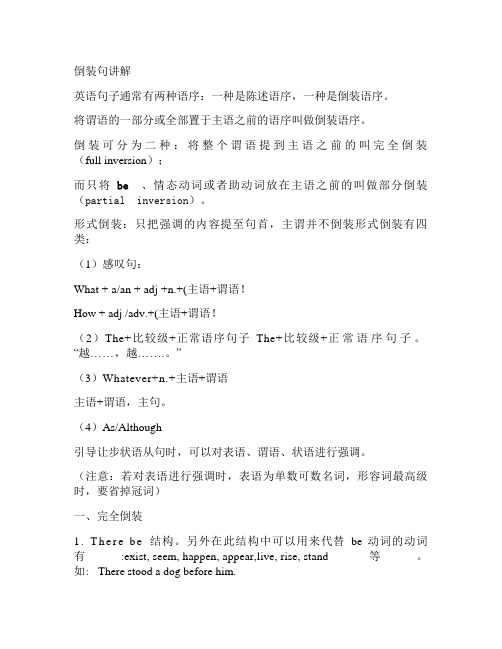
倒装句讲解英语句子通常有两种语序:一种是陈述语序,一种是倒装语序。
将谓语的一部分或全部置于主语之前的语序叫做倒装语序。
倒装可分为二种:将整个谓语提到主语之前的叫完全倒装(full inversion);而只将be 、情态动词或者助动词放在主语之前的叫做部分倒装(partial inversion)。
形式倒装:只把强调的内容提至句首,主谓并不倒装形式倒装有四类:(1)感叹句:What + a/an + adj +n.+(主语+谓语!How + adj /adv.+(主语+谓语!(2)The+比较级+正常语序句子The+比较级+正常语序句子。
“越……,越…….。
”(3)Whatever+n.+主语+谓语主语+谓语,主句。
(4)As/Although引导让步状语从句时,可以对表语、谓语、状语进行强调。
(注意:若对表语进行强调时,表语为单数可数名词,形容词最高级时,要省掉冠词)一、完全倒装1.T h e r e b e结构。
另外在此结构中可以用来代替be动词的动词有:exist, seem, happen, appear,live, rise, stand等。
如: There stood a dog before him.There exist different opinions on this question.2 (1.在以here、there、n o w、then等副词开头的句子里。
“Here, There, Now, Then + come (或be,go,lie,run + 主语"结构。
Here comes the old lady!Then came the hour we had been looking forward to.There comes the bus.Now comes your turn.如果主语是人称代词,就不用倒装。
如:Here you are.There she comes.(2.表示方向的副词out, in, up, down等置于句首,要用全部倒装。
(完整版)倒装句精讲及练习(含答案)

(完整版)倒装句精讲及练习(含答案)倒装句的用法英语倒装句分为两种:1、整个谓语在前的句子,叫完全倒装。
Here comes the car.2、部分谓语(情态动词、助动词、连系动词)在前,谓语的主体部分仍在主语之后的句子,叫部分倒装句。
Only then did he realize that he was wrong.必须弄清的两点:①若有主从句,哪句倒装。
②部分倒装还是完全倒装。
一、表示方位和时间的副词位于句首时(now ,then here ,there,out ,in ,up,down ,away ,back, off,on ), 句子全部倒装。
注:主语是代词时,不倒装。
(如5,6)1. Here comes the bus .2. There goes the bell .3. Away went the students .4. Now comes the chance .Out rushed the children. he rushed.There comes the bus. he comes.注意:1.不能用进行时; 2. 主语为人称代词时不倒装。
二、以介词短语表示的状语,提前位于句首时,全部倒装。
1.In a lecture hall of a university in England sits a professor .2.In front of our school stands a tower .3.By either side of the river grow a lot of apple trees .4.At the top of the mountain stands a temple .5. Among the goods are Christmas trees,flowers and toys.三、表语位于句首时,倒装结构为“表语+连系动词+主语”A: 形容词+连系动词+主语例1.Present at the meeting were Professor White,Professor Smith and many other guests.例2.过去分词+连系动词+主语Gone are the days when they could do what they liked to the Chinese people.四、将so\neither \nor 放在开头,表示“…也(不)…”的意思时,部分倒装注:表示“确实是这样”时,不倒装1.He went to the film last night.So did I .2.You must finish your work ,so must I .3.She is interested in the story ,so am I .4.He didn’t turn up .Neither did his brother .5.His mother told him not to go to the film .So he did.五、在if 条件句中,通常可以省略if ,而将从句倒装条件:在if 条件句,必须含有系动词were, 助动词had 和情态动词should1.Were he younger(=If he were younger ),he would learn skating .2.Should they forget (=If they should forget ) to bring a map with them ,they would get lost in the woods .3.Had they realized (=If they had realized ) how important the task was ,they wouldn’t have refused to accept .4.Were I you ,I would help her .六、否定词或半否定词(never .little ,seldom ,not ,nowhere ,scarely ,few ,by no means ,at no time )位于句首,应部分倒装1.Never have I been there .2.Little did I know about it .3.Seldom did she come late to school .4.Not a single mistake did he make .5.By no means should you buy that kind of car .七、以not until ,no sooner …than , hardly …when ,not only …but also 所引导的状语放在句首时,需要部分倒装1.Not until 10’clock will the library open .2.No sooner had I gone out than he came to see me .3.Hardly had the train arrived when I ran to meet my friend.4.Not only does she speak English but also she follows the British way of life .八、only 及其修饰的状语位于句首时,后面的句子部分倒装。
高中英语倒装句讲解以及习题(附答案)
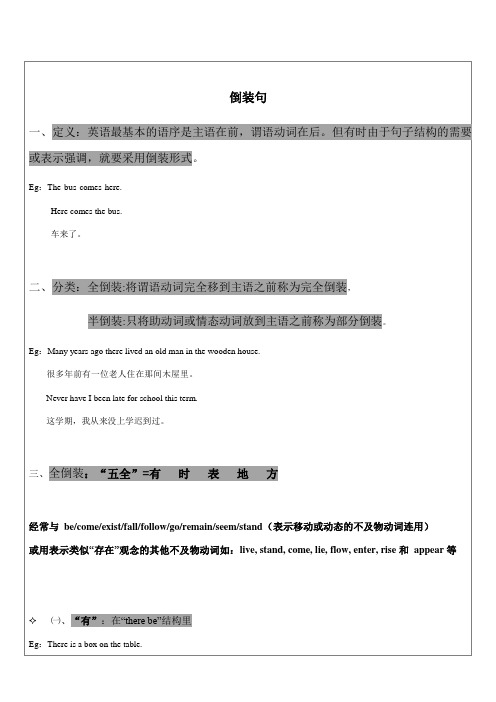
桌子上面有一个盒子。
✧㈡、“时”:表示时间副词,如:now,then,
Eg:Now comes your turn.
现在轮到你了。
✧㈢、“表”:表语放句子前,“表语+系动词+主语” 的结构
Eg:Present at the party were Mr. Green and many other guests.
格林先生和其他的客人在这个聚会上。
Seated on the ground are a group of young men.
一群年轻人坐在了地上。
✧㈣、“地”:地点状语放在句首
Eg:In south of the river lies a small factory.
小工厂位于河的南方。
From the valley came a cry.
山谷传来一阵哭声。
✧㈤、“方”:表方位的副词here, there 或out, in, up, down, away, off 等标志词放在句首 Eg:There lies a large wheat field in front of the house.
房子前面有一大片麦田。
Off all the lights went when I came in.
当我进来时,所有的灯都灭了。
四、半倒装:“八部”=不只让步也常需(虚)如此祝福✧㈠、“不”表示否定。
【英语】英语倒装句的基本方法技巧及练习题及练习题(含答案)及解析
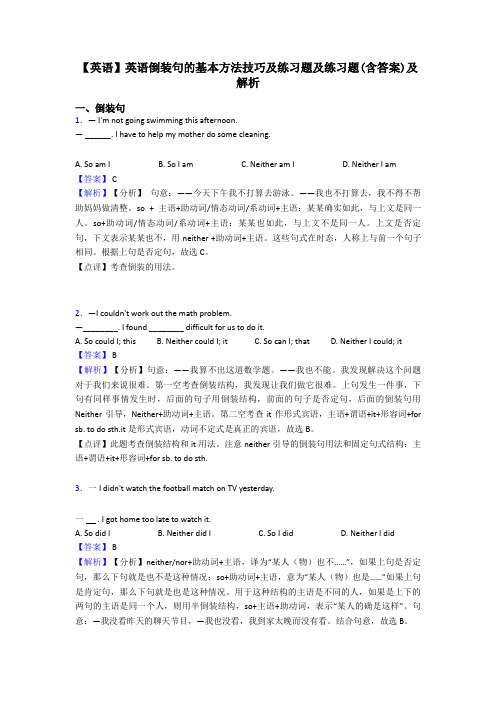
【英语】英语倒装句的基本方法技巧及练习题及练习题(含答案)及解析一、倒装句1.— I'm not going swimming this afternoon.— ______. I have to help my mother do some cleaning.A. So am IB. So I amC. Neither am ID. Neither I am【答案】 C【解析】【分析】句意:——今天下午我不打算去游泳。
——我也不打算去,我不得不帮助妈妈做清整。
so + 主语+助动词/情态动词/系动词+主语:某某确实如此,与上文是同一人。
so+助动词/情态动词/系动词+主语:某某也如此,与上文不是同一人。
上文是否定句,下文表示某某也不,用 neither +助动词+主语。
这些句式在时态,人称上与前一个句子相同。
根据上句是否定句,故选C。
【点评】考查倒装的用法。
2.—I couldn't work out the math problem.—________. I found ________ difficult for us to do it.A. So could I; thisB. Neither could I; itC. So can I; thatD. Neither I could; it【答案】 B【解析】【分析】句意:——我算不出这道数学题。
——我也不能。
我发现解决这个问题对于我们来说很难。
第一空考查倒装结构,我发现让我们做它很难。
上句发生一件事,下句有同样事情发生时,后面的句子用倒装结构,前面的句子是否定句,后面的倒装句用Neither引导,Neither+助动词+主语。
第二空考查it作形式宾语,主语+谓语+it+形容词+for sb. to do sth.it是形式宾语,动词不定式是真正的宾语,故选B。
【点评】此题考查倒装结构和it用法。
注意neither引导的倒装句用法和固定句式结构:主语+谓语+it+形容词+for sb. to do sth.3.一 I didn't watch the football match on TV yesterday.一 . I got home too late to watch it.A. So did IB. Neither did IC. So I didD. Neither I did【答案】 B【解析】【分析】neither/nor+助动词+主语,译为“某人(物)也不……”,如果上句是否定句,那么下句就是也不是这种情况;so+助动词+主语,意为“某人(物)也是……”如果上句是肯定句,那么下句就是也是这种情况。
英语倒装句精讲及习题(附答案)

英语倒装句精讲及习题(附答案)英语句子的自然语序是主语在前,谓语动词在后。
把谓语动词放在主语之前,就叫倒装结构。
如果全部谓语放在主语之前,叫全部倒装;只把助动词或情态动词放在主语之前就叫部分倒装。
一、完全倒装1.时间状语now,then等,地点状语here,there, out,in,up,down,away等副词位于句首①Here comes the bus. ②There goes the bell. ③Now comes your turn. ④Out went the children. 当代词作主语时,主谓语序不变。
例如:⑤Here it is. 在这儿。
⑥Here he comes. 他来了。
2.当句首状语为表示时间或地点的介词词组时,也常常引起全部倒装①在城市南部坐落着一家钢铁工厂。
South of the city lies a big steel factory.②从山谷里传来了一阵可怕的声音。
From the valley came a frightening sound.3.表语置于句首时,倒装结构为“表语+连系动词+主语”1)形容词+连系动词+主语出席会议的有怀特教授,史密斯教授,格林教授及其他嘉宾。
Present at the meeting were Professor White, Professor Smith, Professor Greenand many other guests2)过去分词+连系动词+主语他们可以随心所欲的日子过去了。
Gone are the days when they would do what they liked.二、部分倒装1.用于疑问句Do you speak English?2.If引导的条件状语从句谓语动词为were, had或should时,可省去if,把那三个词挪至句首。
Had you reviewed your lessons,you might have passed the examination.Were there enough hands, we should go on with the project.Should I be free tomorrow, I will come to the party.3.用于“形容词(或名词、动词)+as(though)引导的让步状语从句中”①Pretty as she is, she is not clever. ②Try as he could, he might fall again.如果从句的表语是名词,其名词前不加任何冠词。
【英语】必备英语倒装句技巧全解及练习题(含答案)及解析
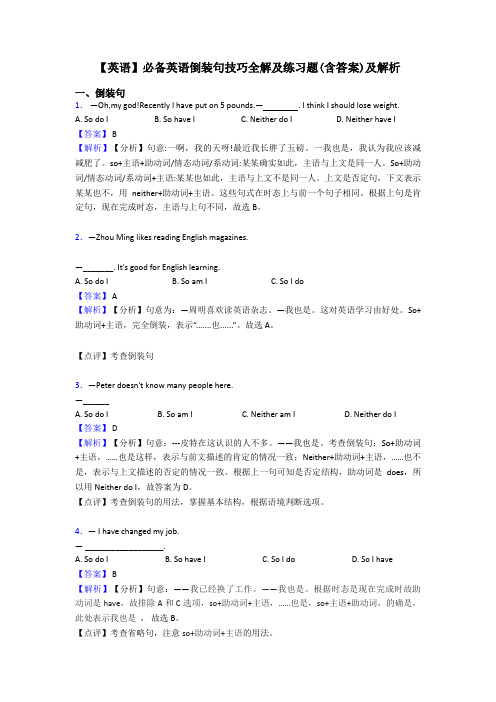
【英语】必备英语倒装句技巧全解及练习题(含答案)及解析一、倒装句1.—Oh,my god!Recently I have put on 5 pounds.—. I think I should lose weight.A. So do IB. So have IC. Neither do ID. Neither have I【答案】 B【解析】【分析】句意:一啊,我的天呀!最近我长胖了五磅。
一我也是,我认为我应该减减肥了。
so+主语+助动词/情态动词/系动词:某某确实如此,主语与上文是同一人。
So+助动词/情态动词/系动词+主语:某某也如此,主语与上文不是同一人。
上文是否定句,下文表示某某也不,用neither+助动词+主语。
这些句式在时态上与前一个句子相同。
根据上句是肯定句,现在完成时态,主语与上句不同,故选B。
2.—Zhou Ming likes reading English magazines.—_______. It's good for English learning.A. So do IB. So am IC. So I do【答案】 A【解析】【分析】句意为:—周明喜欢读英语杂志。
—我也是。
这对英语学习由好处。
So+助动词+主语,完全倒装,表示“.......也......”。
故选A。
【点评】考查倒装句3.—Peter doesn't know many people here.—______A. So do IB. So am IC. Neither am ID. Neither do I【答案】 D【解析】【分析】句意:---皮特在这认识的人不多。
——我也是。
考查倒装句:So+助动词+主语,……也是这样,表示与前文描述的肯定的情况一致;Neither+助动词+主语,……也不是,表示与上文描述的否定的情况一致。
根据上一句可知是否定结构,助动词是does,所以用Neither do I,故答案为D。
(完整版)倒装句全面讲解和练习(答案)

(完整版)倒装句全面讲解和练习(答案)初中英语倒装句(一)倒装句的意义1、适应一定的语法结构的需要,主要是指疑问句句型结构的需要。
E.g. Was the People’s Liberation Army founded in 1927?2、为了强调某一部分,而把这部分放到句首,构成倒装。
e.g. Never have I been late for school this term.(二)倒装的使用情况一、部分倒装:就是把谓语中的be动词、助动词或情态动词置于主语前面。
常见于下列几种情况:(一). only所修饰的副词,介词短语或状语从句放在句首时,要用:only+ 状语+ be /助动词/情态动词+主语及其他例如:Only when he told me the news did I know what had happened.注意:only修饰主语时,不需要倒装。
例如:Among all the people, only you know the truth.小试牛刀:Only in this way ________to make improvement in the operating system.A. you can hopeB. you did hopeC. can you hopeD. did you hope(二).含有否定意义的副词或连词放在句首时。
如:never, little, seldom, not, not only, not until, no sooner (…than), hardly (…when), rarely, scarcely, in no way等。
例如:We seldom get up at four in the morning.= Seldom do we get up at four in the morning.Not a single word from him could express his feelings.(1) hardly…when; scarcely…when…; no sooner…than… 可以用正常语序had hardly done when… did 或用倒装句式Hardly had +主语+ done when… did 句式。
倒装知识点详解及习题,带详解
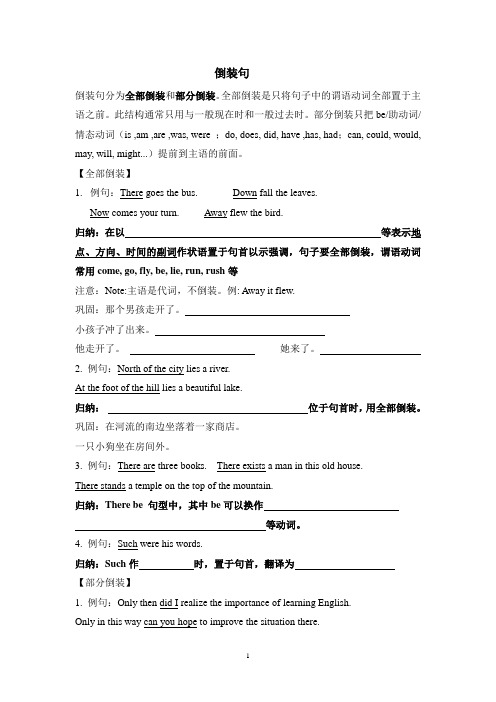
倒装句倒装句分为全部倒装和部分倒装。
全部倒装是只将句子中的谓语动词全部置于主语之前。
此结构通常只用与一般现在时和一般过去时。
部分倒装只把be/助动词/情态动词(is ,am ,are ,was, were ;do, does, did, have ,has, had;can, could, would, may, will, might...)提前到主语的前面。
【全部倒装】1.例句:There goes the bus. Down fall the leaves.Now comes your turn. Away flew the bird.归纳:在以等表示地点、方向、时间的副词作状语置于句首以示强调,句子要全部倒装,谓语动词常用come, go, fly, be, lie, run, rush等注意:Note:主语是代词,不倒装。
例: Away it flew.巩固:那个男孩走开了。
小孩子冲了出来。
他走开了。
她来了。
2. 例句:North of the city lies a river.At the foot of the hill lies a beautiful lake.归纳:位于句首时,用全部倒装。
巩固:在河流的南边坐落着一家商店。
一只小狗坐在房间外。
3. 例句:There are three books. There exists a man in this old house.There stands a temple on the top of the mountain.归纳:There be 句型中,其中be可以换作等动词。
4. 例句:Such were his words.归纳:Such作时,置于句首,翻译为【部分倒装】1. 例句:Only then did I realize the importance of learning English.Only in this way can you hope to improve the situation there.Only after he came back was I able to see him.归纳:only所修饰的放在句首时, 要进行部分倒装,主倒从不倒注:only修饰主语,不倒装,如:Only socialism can save China.Only he can do this job.2. 例句:Never have I seen a better film. Seldom does he go to the park.In no case did he give in to the enemy.归纳:位于句首时,用部分倒装。
中考英语倒装句解题技巧讲解及练习题(含答案)

中考英语倒装句解题技巧讲解及练习题(含答案)一、倒装句1.–I usually go hiking with my friends.-- ____do I.A. NorB. SoC. Neither【答案】 B【解析】【分析】句意:一一我经常和朋发一起去徒步旅行。
一一我也是。
肯定句后跟”so+谓语+主语“,表示某人某物也……;否定句后跟"Neither/Nor+谓语+主语”,表示某人某物也不……。
本题前句是肯定句,故选B。
2.—Zhou Ming likes reading English magazines.—_______. It's good for English learning.A. So do IB. So am IC. So I do【答案】 A【解析】【分析】句意为:—周明喜欢读英语杂志。
—我也是。
这对英语学习由好处。
So+助动词+主语,完全倒装,表示“.......也......”。
故选A。
【点评】考查倒装句3.—More and more people prefer to walk rather than ride in cars.—________. Walking is good for health.A. So they areB. So are theyC. So they doD. So do they【答案】 C【解析】【分析】句意:——越来越多的人比起开车更喜欢走路。
——确实如此,走路对健康有好处。
A他们也是,B是啊,C是啊,D他们也是。
根据 Walking is good for health,可知表示确实是这样,起强调作用,用so+主语+助动词,因此排除B和D;再根据谓语prefer,实义动词,和主语people可知,应用助动词do,故选C。
【点评】考查倒装句,注意理解倒装句so do they和陈述句so they do的意义及用法区别。
【英语】英语倒装句解题技巧(超强)及练习题(含答案)

【英语】英语倒装句解题技巧(超强)及练习题(含答案)一、倒装句1.—I've finished my homework, Tony.—_______.A. So have IB. So I haveC. So did ID. So I did【答案】 A【解析】【分析】句意:托尼,我已经完成了我的作业。
——我也是。
So +助动词+主语,表示同样,也;So+主语+助动词,表示的确,确实。
结合句意,表示也做完了,故排除BD 两项。
根据I've 可知此处的助动词是have, 故选A。
【点评】考查倒装句的用法。
2.—Many students won 't take part in the after-school activities today.— .We have so much homework to do!A. So will IB. So do IC. Neither will ID. Neither do I【答案】 C【解析】【分析】句意:—今天许多学生不愿意参见课外活动。
—我也不愿意。
我们有那么多作业要做。
So+助动词+主语,表示与前面的肯定形式一致,表示也。
Neither+助动词+主语,表示与前面的否定形式一致,表示也不。
这两种部分倒装结构中的助动词与前一句的助动词一致,根据Many students won 't take part in the after-school activities today.可知此处won't表示否定形式,故用Neither+will+主语,故选C。
【点评】此题考查倒装句。
注意助动词与前一句的助动词一致。
3.—I didn't go to the cinema yesterday. What about you?—____________, because I was preparing for the project all the time.A. Nor do IB. Neither did IC. Neither am ID. Nor was I【答案】 B【解析】【分析】句意:—我昨天没有去电影院,你的?—我也没去,因为我一直在准备这个项目。
英语倒装句解题技巧讲解及练习题(含答案)及解析
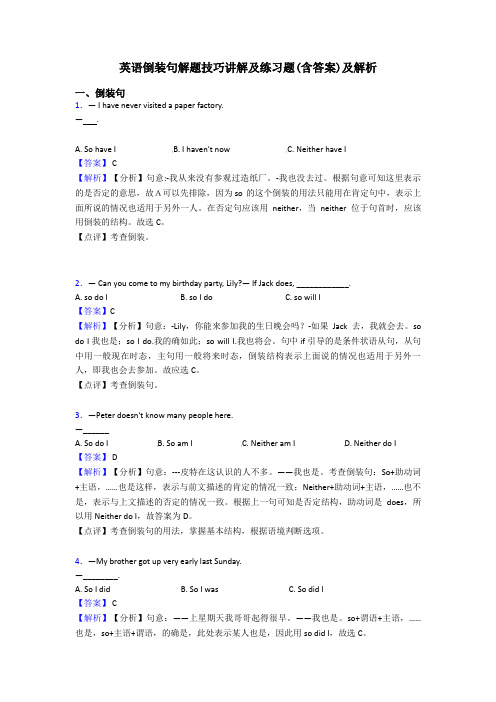
英语倒装句解题技巧讲解及练习题(含答案)及解析一、倒装句1.— I have never visited a paper factory.— .A. So have IB. I haven't nowC. Neither have I【答案】 C【解析】【分析】句意:-我从来没有参观过造纸厂。
-我也没去过。
根据句意可知这里表示的是否定的意思,故A可以先排除,因为so 的这个倒装的用法只能用在肯定句中,表示上面所说的情况也适用于另外一人。
在否定句应该用neither,当neither 位于句首时,应该用倒装的结构。
故选C。
【点评】考查倒装。
2.— Can you come to my birthday party, Lily?— If Jack does, ____________.A. so do IB. so I doC. so will I【答案】C【解析】【分析】句意:-Lily,你能来参加我的生日晚会吗?-如果Jack去,我就会去。
so do I我也是;so I do.我的确如此;so will I.我也将会。
句中if引导的是条件状语从句,从句中用一般现在时态,主句用一般将来时态,倒装结构表示上面说的情况也适用于另外一人,即我也会去参加。
故应选C。
【点评】考查倒装句。
3.—Peter doesn't know many people here.—______A. So do IB. So am IC. Neither am ID. Neither do I【答案】 D【解析】【分析】句意:---皮特在这认识的人不多。
——我也是。
考查倒装句:So+助动词+主语,……也是这样,表示与前文描述的肯定的情况一致;Neither+助动词+主语,……也不是,表示与上文描述的否定的情况一致。
根据上一句可知是否定结构,助动词是does,所以用Neither do I,故答案为D。
【点评】考查倒装句的用法,掌握基本结构,根据语境判断选项。
(英语)英语倒装句练习题20篇及解析

(英语)英语倒装句练习题20篇及解析一、倒装句1.–David has made great progress recently. – ______, and ______.A. So he has; so you haveB. So has he; so you haveC. So he has; so have youD. So has he; so have you【答案】 C【解析】【分析】句意为:---戴维最近取得了很大进步。
---确实如此。
你也一样。
“so+be 动词(助动词、情态动词)+主语” 表示前面所叙述的事实也适合于另一个人,“也”之意。
“so+主语+be动词(助动词、情态动词)”表示肯定前面所叙述的是事实,“确实如此”之意。
结合语境可知应选C。
【点评】考查固定句型的用法。
2.—I don't understand the story in the new unit. What about you, Bill?—_____.A. Neither I doB. Neither do IC. So do ID. So I do【答案】 B【解析】【分析】句意:——我不懂新单元中的故事。
你呢,比尔?——我也不懂。
表示前面所说的情况同样适用于后面的人或物,用完全倒装结构,前面是否定句用前者用neither/nor+系动词be/助动词/情态动词+主语。
故选B。
【点评】此题考查情景交际。
要注意特殊句式结构的使用。
3.— Peter doesn't know many people here.— __________.A. So do IB. So am IC. Neither am ID. Neither do I【答案】 D【解析】【分析】句意:—皮特不认识这里的很多人。
—我也不认识。
题干是否定句,故用“neither+助动词+主语”表示和上句一样也不……;根据doesn't know 可知,用助动词do , 故选D。
倒装句讲解及练习高中带答案解析
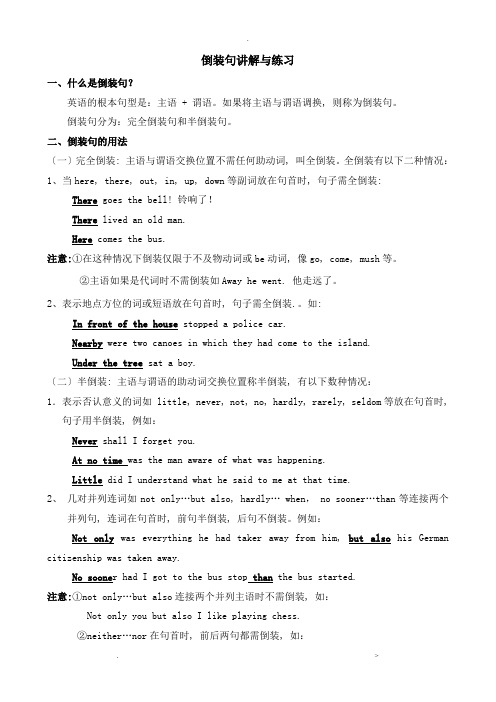
倒装句讲解与练习一、什么是倒装句?英语的根本句型是:主语 + 谓语。
如果将主语与谓语调换, 则称为倒装句。
倒装句分为:完全倒装句和半倒装句。
二、倒装句的用法〔一〕完全倒装: 主语与谓语交换位置不需任何助动词, 叫全倒装。
全倒装有以下二种情况:1、当here, there, out, in, up, down等副词放在句首时, 句子需全倒装:There goes the bell! 铃响了!There lived an old man.Here comes the bus.注意:①在这种情况下倒装仅限于不及物动词或be动词, 像go, come, mush等。
②主语如果是代词时不需倒装如Away he went. 他走远了。
2、表示地点方位的词或短语放在句首时, 句子需全倒装.。
如:In front of the house stopped a police car.Nearby were two canoes in which they had come to the island.Under the tree sat a boy.〔二〕半倒装: 主语与谓语的助动词交换位置称半倒装, 有以下数种情况:1.表示否认意义的词如 little, never, not, no, hardly, rarely, seldom等放在句首时, 句子用半倒装, 例如:Never shall I forget you.At no time was the man aware of what was happening.Little did I understand what he said to me at that time.2、几对并列连词如not only…but also, hardly… when, no sooner…than等连接两个并列句, 连词在句首时, 前句半倒装, 后句不倒装。
例如:Not only was everything he had taker away from him, but also his German citizenship was taken away.No soone r had I got to the bus stop than the bus started.注意:①not only…but also连接两个并列主语时不需倒装, 如:Not only you but also I like playing chess.②neither…nor在句首时, 前后两句都需倒装, 如:Neither do I have a sister nor does my husband.3、only放在句首强调状语时, 主句用半倒装。
倒装句知识点归纳及练习(附答案)
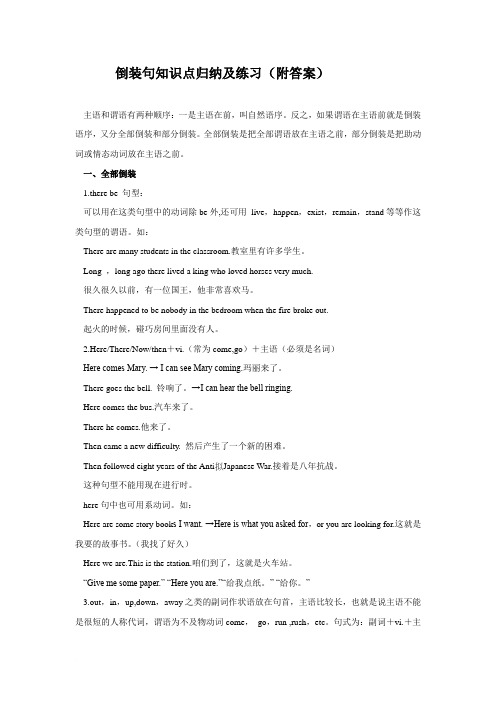
倒装句知识点归纳及练习(附答案)主语和谓语有两种顺序:一是主语在前,叫自然语序。
反之,如果谓语在主语前就是倒装语序,又分全部倒装和部分倒装。
全部倒装是把全部谓语放在主语之前,部分倒装是把助动词或情态动词放在主语之前。
一、全部倒装1.there be 句型:可以用在这类句型中的动词除be外,还可用live,happen,exist,remain,stand等等作这类句型的谓语。
如:There are many students in the classroom.教室里有许多学生。
Long ,long ago there lived a king who loved horses very much.很久很久以前,有一位国王,他非常喜欢马。
There happened to be nobody in the bedroom when the fire broke out.起火的时候,碰巧房间里面没有人。
2.Here/There/Now/then+vi.(常为come,go)+主语(必须是名词)Here comes Mary. → I can see Mary coming.玛丽来了。
There goes the bell. 铃响了。
→I can hear the bell ringing.Here comes the bus.汽车来了。
There he comes.他来了。
Then came a new difficulty. 然后产生了一个新的困难。
Then followed eight years of the Anti Japanese War.接着是八年抗战。
这种句型不能用现在进行时。
here句中也可用系动词。
如:Here are some story book s I want. →Here is what you asked for,or you are looking for.这就是我要的故事书。
英语倒装句讲解和练习附答案
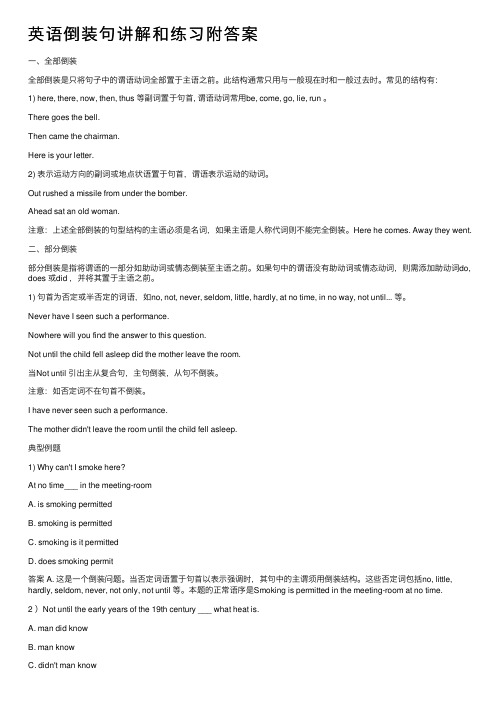
英语倒装句讲解和练习附答案⼀、全部倒装全部倒装是只将句⼦中的谓语动词全部置于主语之前。
此结构通常只⽤与⼀般现在时和⼀般过去时。
常见的结构有:1) here, there, now, then, thus 等副词置于句⾸, 谓语动词常⽤be, come, go, lie, run 。
There goes the bell.Then came the chairman.Here is your letter.2) 表⽰运动⽅向的副词或地点状语置于句⾸,谓语表⽰运动的动词。
Out rushed a missile from under the bomber.Ahead sat an old woman.注意:上述全部倒装的句型结构的主语必须是名词,如果主语是⼈称代词则不能完全倒装。
Here he comes. Away they went.⼆、部分倒装部分倒装是指将谓语的⼀部分如助动词或情态倒装⾄主语之前。
如果句中的谓语没有助动词或情态动词,则需添加助动词do, does 或did ,并将其置于主语之前。
1) 句⾸为否定或半否定的词语,如no, not, never, seldom, little, hardly, at no time, in no way, not until... 等。
Never have I seen such a performance.Nowhere will you find the answer to this question.Not until the child fell asleep did the mother leave the room.当Not until 引出主从复合句,主句倒装,从句不倒装。
注意:如否定词不在句⾸不倒装。
I have never seen such a performance.The mother didn't leave the room until the child fell asleep.典型例题1) Why can't I smoke here?At no time___ in the meeting-roomA. is smoking permittedB. smoking is permittedC. smoking is it permittedD. does smoking permit答案 A. 这是⼀个倒装问题。
英语倒装句解题技巧及练习题及解析

英语倒装句解题技巧及练习题及解析一、倒装句1.– Will Tony go for the picnic at the weekend?– If I don't go, ______.A. so does heB. neither will heC. neither he does【答案】 B【解析】【分析】neither+主语+谓语,表示对前句所说内容的肯定,neither+谓语+主语,表示前句所说情况也适用于后者,句意:Tony周末去野餐吗?如果我不去,他也不去。
前句情况也适用于后者,所以用倒装,故选B。
【点评】考查倒装句的用法。
2.If you go to his party tomorrow,A. won't, neither do IB. don't, neither will IC. don't, neither do ID. /, so do I 【答案】 B【解析】【分析】句意:如果你明天不参加他的聚会,我也不去。
分析:考查if引导的条件状语从句,通过时间状语tomorrow体现时间将来时,因此从句用一般现在时,主语是第二人称用do; 我也不去,为主句,同时前句为否定形式,因此用neither.故选 B【点评】考查if条件状语从句应使用主将从现。
3.— My mother hardly watches any sports shows.—_________A. So do mine.B. So does mine.C. Neither do mine.D. Neither does mine.【答案】 D【解析】【分析】句意:—我妈妈几乎不看任何体育节目。
—我的妈妈也不看。
当A做的事,B和A做了相同事时,B说“So+助动词/情态动词…+B”;当A没做某事,B也没做,B 可说“Neither/nor+助动词/情态动词…+B”。
mine指的是my mother,根据主谓一致原则,可知使用助动词does,结合句意和语境可知选D。
倒装句的语法讲解+习题
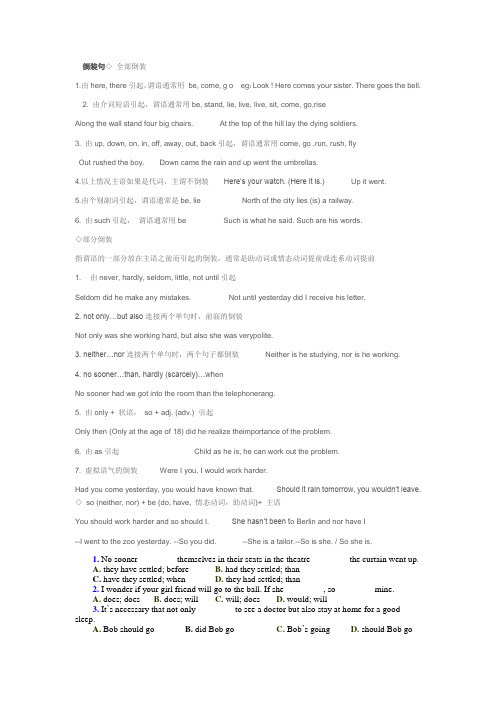
倒装句◇全部倒装1.由here, there引起,谓语通常用be, come, g o eg:Look ! Here comes your sister. There goes the bell.2. 由介词短语引起,谓语通常用be, stand, lie, live, live, sit, come, go,riseAlong the wall stand four big chairs. At the top of the hill lay the dying soldiers.3. 由up, down, on, in, off, away, out, back引起,谓语通常用come, go ,run, rush, flyOut rushed the boy. Down came the rain and up went the umbrellas.4.以上情况主语如果是代词,主谓不倒装Here’s your watch. (Here it is.)Up it went.5.由个别副词引起,谓语通常是be, lie North of the city lies (is) a railway.6. 由such引起,谓语通常用be Such is what he said. Such are his words.◇部分倒装指谓语的一部分放在主语之前而引起的倒装,通常是助动词或情态动词提前或连系动词提前1. 由never, hardly, seldom, little, not until引起Seldom did he make any mistakes. Not until yesterday did I receive his letter.2. not only…but also连接两个单句时,前面的倒装Not only was she working hard, but also she was verypolite.3. neither…nor连接两个单句时,两个句子都倒装Neither is he studying, nor is he working.4. no sooner…than, hardly (scarcely)…wh enNo sooner had we got into the room than the telephonerang.5. 由only + 状语,so + adj. (adv.) 引起Only then (Only at the age of 18) did he realize theimportance of the problem.6. 由as引起Child as he is, he can work out the problem.7. 虚拟语气的倒装Were I you, I would work harder.Had you come yesterday, you would have known that. Should it rain tomorrow, you wouldn’t leave.◇so (neither, nor) + be (do, have, 情态动词,助动词)+ 主语You should work harder and so should I. She hasn’t been t o Berlin and nor have I--I went to the zoo yesterday. --So you did. --She is a tailor.--So is she. / So she is.1. No sooner ________ themselves in their seats in the theatre ________ the curtain went up.A. they have settled; beforeB. had they settled; thanC. have they settled; whenD. they had settled; than2. I wonder if your girl friend will go to the ball. If she ________ , so ________ mine.A. does; doesB. does; willC. will; doesD. would; will3. It’s necessary that not only ________ to see a doctor but also stay at home for a good sleep.A. Bob should goB. did Bob goC. Bob’s goingD. should Bob go4. In ________ , but out ________ again.A. came the teacher; he wentB. came the teacher; went heC. did the teacher come; he wentD. the teacher came; went he5. It’s beyond description. Nowhere else in the world ________ such a quiet, beautiful place.A. can there beB. you can findC. there can beD. can find you6. Not until Dec. 2003 ________ caught by the US soldiers, and it was a great victory for the USA.A. was Saddam HusseinB. Saddam Hussein wasC. had Saddam Hussein beenD. Saddam Hussein had been7. Only after ________ his homework ________ to watch TV.A. he has finished; is he allowedB. has he finished; is he allowedC. he has finished; he is allowedD. has he finished; he is allowed8. Form then on we never saw her again, nor ________ from her.A. heard weB. had we heardC. we have heardD. did we hear9.“Never ____ to hurt your feeling while I was expressing myself in the discussion”explained Jim.A. I expectedB. expected IC. had I expectedD. did I expect10. ________ our bus; we’ll have to wait for the next.A. Does there goB. It goesC. There goesD. Does it go11.-It was careless of you to have left your new bike outside all night. -My god!________ .A. So did IB. So I didC. So was ID. So were you12. What a naughty boy he was! ________ .A. Down jumped he from the deskB. From the desk jumped he downC. He down jumped from the deskD. Down he jumped from the desk13. On the opposite wall ________ one map ________ dozens of pictures.A. hang; includingB. are hung; together withC. is hanged; withD. is hanging; as well as14. You can never use my computer. At no time ________ that machine.A. you should touchB. should you touchC. touch should youD. you touch15. Not until all the fish died in the river ________ how serious the pollution was.A. did the villagers realizeB. the villagers realizedC. the villagers did realizeD. didn’t the villagers realize【答案解析】1. B. 因为以否定词或半否定词开头的句子,要用部分倒装,排除A和D。
(英语)英语倒装句技巧和方法完整版及练习题

(英语)英语倒装句技巧和方法完整版及练习题一、倒装句1.——Lucy can't go mountain climbing with us tomorrow.——_________ I have to do housework at home.A. So can I.B. Neither can I.C. Neither I can.【答案】 B【解析】【分析】句意:——明天露西不能和我们一起去爬山。
——我也不能去。
我不得不在家里做作业。
So+助动词/情态动词/系动词+主语:某某也如此,与上文不是同一人。
上文是否定句,下文表示某某也不,用neither +助动词/情态动词/系动词+主语。
这些句式在时态上与前一个句子相同。
根据上句用情态动词can,是否定句,结合句意,故选B。
2.—I don't understand the story in the new unit. What about you, Bill?—_____.A. Neither I doB. Neither do IC. So do ID. So I do【答案】 B【解析】【分析】句意:——我不懂新单元中的故事。
你呢,比尔?——我也不懂。
表示前面所说的情况同样适用于后面的人或物,用完全倒装结构,前面是否定句用前者用neither/nor+系动词be/助动词/情态动词+主语。
故选B。
【点评】此题考查情景交际。
要注意特殊句式结构的使用。
3.—We are not allowed to bring any snacks or drinks at the school meeting.— .A. Neither are weB. Neither do weC. So are weD. So do we【答案】 A【解析】【分析】句意:—我们在学校会议上不被允许带任何零食和饮料。
—我们也是。
根据We are not allowed可知此处表示否定,并且助动词用are,故表示我们也不被允许,用Neither are we。
- 1、下载文档前请自行甄别文档内容的完整性,平台不提供额外的编辑、内容补充、找答案等附加服务。
- 2、"仅部分预览"的文档,不可在线预览部分如存在完整性等问题,可反馈申请退款(可完整预览的文档不适用该条件!)。
- 3、如文档侵犯您的权益,请联系客服反馈,我们会尽快为您处理(人工客服工作时间:9:00-18:30)。
倒装句倒装可分为完全倒装、部分倒装和其他倒装。
一.完全倒装:将谓语动词直接提到主语前。
常见情况有:1. 以here, there 或out , in, up, down, away等词开头的句子里以示强调。
There goes the bell. Here comes the bus.Out rushed the children. Away went the boy.注意:但主语是人称代词时,主语语序不变。
Here it is. Away he went.2.地点状语放句首South of the river lies a small factory.From the valley came a frightening sound.3. such, the following 放句首时Such are the facts. Such is life.The following is the answer to the question.二. 部分倒装:将情动、助动、系动提到主语前。
常见情况有:1. Only修饰的副词,介词短语或状语从句放在句首时。
Only then did I realize that I was wrong.Only in this way can you learn from your mistakesOnly when the war was over in 1918 was he able to get happily back to work.2.含有否定意义的副词或连词, 如:hardly, never, not, not only, little , neither…nor…, not until…,no sooner…than…, seldom (Often)等放在句首时。
Never shall I forget it. Never before have I seen such a film.Not a single mistake did he make. (他一点错也没出)Hardly had I reached the bus stop when the bus startedNot only was everything he had taken away from him, but also his German citizenship.Nowhere in the world can there be such a quiet and beautiful place.Little does he care about what others think.Often did we warn them not to do so.3.把副词so放在句首,表示前面所说的情况, 也适合于另一人或物。
肯定句用so,否定句用neither,句式如下:So + be ( have, 助动词或情态动词) + 主语。
否定形式:neither (nor) + be ( have, 助动词或情态动词) + 主语。
He likes rice very well. So do I.I have never been there, and neither has he.4. 表祝愿。
May you succeed!5. 省略if 时,将had, should, were 提到主语前。
Had I knew it, I wouldn’t have done it.三. 其他倒装。
1. 表语置于句首时,倒装结构为“表语+ 连系动词+ 主语”Present at the party were Mr. Green and many other guests.Seated on the ground are a group of young men.Gone are the days when we used the “foreign oil”.So frightened was he that he didn’t dear to move.So loudly do the students read their lessons that people can hear them out in the street.2. as: 尽管句式:(1)表语/状语+ as + 主语+ 系动/实动,主句。
(2)动原+as + 主语+ will/may, 主句。
Child as he is, he knows much English.Much he loves his son, he is strict with him.3. No matter how/However + adj./adv.+主语+ 谓语, 主句。
However/No matter how late it is, she often waits for him.四. 巩固练习1.______ to rain tomorrow , they would put off the meeting.A. If it shouldB. If were itC. Should itD. were it2. ______ got into the room ______ the telephone rang.A. No sooner had he, whenB. He hardly had, thenC. Hardly had he, whenD. He hardly had, then3. ______ find out what had happened.A. Until he woke up did heB. Until he woke up toC. Not until did he wake up heD. Not until he woke up did he .4. Little ______ about his own health though he was very ill.A. he caredB. he caresC. does he careD. did he care5. Early in the day ______ the news ______ the enemy were gone.A. come, thatB. came , thatC. comes ,thatD. came , what6. Not only ______ strict with us, but also ______ for us.A. was the teacher ; did he careB. was the teacher ; he caredC. the teacher was ; did he careD. the teacher was ; did he care7. ______, he knows a lot of English .A. Child as he isB. As he is a ChildC. A child as he isD. Child though he was8. ______ the cat , she has to give it to the neighbor.A. As she likes muchB. As she much likesC. Much as she likesD. As much she likes9. Be quick! ______.A. Here comes the busB. The bus here comesC. The bus come hereD. Here the bus comes10. If you want to go there, ______.A. so will IB. so I willC. I will soD. so do I11. In front of the farmhouse ______.A. does a small boy sitB. did a small boy sitC. sit a small boyD. sat a small boy12. Scarcely ______ down when ______ a knock at the door.A. had he sat ; did he hearB. he had sat ; did he hearC. he had sat ; he heardD. had he sat ; he heard13. Here ______. A. does he come B. he comes C, comes he D. he come14. Only ______ that.A. can a doctor doB. a doctor can doC. can do a doctorD. can a doctor does15. Not even once ______ a lie.A. has Mike toldB. Mike has toldC. had Mike toldD. Mike had told16. Up ______ into the air.A. went the arrowB. the arrow wentC. did the arrow goD. does the arrow go17. Not for a moment ______ what he said.A. I believedB. did I believeC. I would believeD. I believe18. Under the big tree ______ of seven years old.A. sat a little girlB. did a little girl satC. a little girlD. a little girl sat19. In ______ and the students stood up.A. the teacher comesB. the teacher comingC. came the teacherD. did the teacher come20. No sooner ______ begun to speak than I realized that something was wrong.A. he hasB. he hadC. had heD. did he21. Nowhere else in the world ______ a place so beautiful.A. you can find B . find you C. can you find D. do you find22. "Your ticket, Please?" " ______."A. Here you areB. Here are youC. You are hereD. I give you it23. Hardly ______ the house, when he was caught.A. the thief had enteredB. entered the thiefC. had the thief enteredD. was the thief entering24. Seldom ______ late ______ the meeting room.A. does he come; toB. comes he; forC. does he; forD. comes he; to25. Never before ______ such a good film ______ "007."A. have I seen ; asB. I have seen; likeC. had I seen; likeD. I have seen; as26. The girl likes singing and dancing. ______.A. So she doesB. So is sheC. So am ID. So she can27. Never ______ early in the morning.A. he gets up .B. gets up heC. does he get upD. up he gets28. So loudly ______ that every people in the next room could hear him.A. did he speakB. he spokeC. did speak heD. he speaks29. On the river bank, ______ where he once lived.A. stand a houseB. a house standC. does a house standD. stands a house30. I won't go, ______.A. any of my classmates will go nor .B. nor will not any of my classmatesC. nor will any of my classmatesD. nor do any of my classmates31. Only in a socialist country ______ the people's interests.A. science can serveB. does science can serveC. can science serveD. can serve science for32. Rarely ______ a bike like that nowadays.A. we seeB. see weC. do see weD. do we see33. No longer ______ to be a member of this club.A. is he fitB. he is fitC. he fitD. fit he34. Little ______ that the police are about to arrest him.A. do he knowB. does he knowC. he knowsD. he know35. ___from the hill.A. Down ran the childB. Ran down the childC. Down ran he.D. The child down ran.36. So funny did he look ____everyone stared at him.A. andB. at thatC. thatD. so that37. ____ I like it, I'll not buy itA. As muchB. AsC. Much asD. As much as38. Try as they would, ___ find nothing.A. could theyB. theyC. they couldD. can they39. Brave ___ he is, he trembled at the sight of a snake.A. man asB. man thoughC. a man thoughD. a man as40. Out ____, gun in handA. he rushedB. rushed heC. did he rushD. did rush he参考答案:1-5 DCDDB 6-10 BACAA 11-15 DDBBA16-20 ABACC 21-25 CACAA 26-30ACADC31-35 CDABA 36-40 CCCAA。
